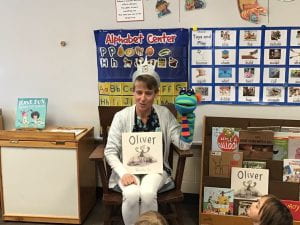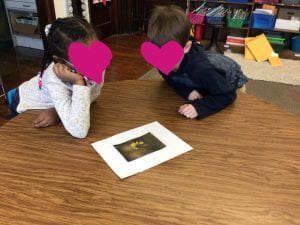In February of 2022, I wrote about staying grounded. Part of that post was dedicated to staying grounded in the classroom. A year later, to the day, I find myself writing about the very same topic. Last week, I was asked to serve as a substitute teacher on four different days: I was able to do so on two of the four days. I have mixed emotions about serving as a sub.
Serving as a Substitute Teacher
On the one hand, being in the classroom as the teacher (as opposed to the instructional coach) slaps a person right back into the reality of the day-to-day work of a classroom teacher. I like to think that I have not lost sight of this reality since my exit from the classroom in 2018. I know all-too-well the high demands of classroom teachers including, but not limited to, the minute-to-minute decision making (“Can I go to the bathroom?” “Where should I put this note from my mom?” “Can I go to the office to report the classmate that just punched me at recess?” “How long should this paragraph be?” “When is the assembly?” “Are we going to get time to work on our assignment in class?”).
On the other hand, serving as an instructional coach does remove you from the day-to-day goings-on in a classroom and allows for a slightly more flexible schedule, so it could be easy to lose sight of the pressure and tension that come with being in the classroom. Again, I like to think that I have not lost sight of this.
As much as I love being in the classroom and working with kids, being asked to substitute teach can be aggravating. It is not the same as having your own classroom, where you have established relationships with students and their families (one of my absolute favorite things about being a classroom teacher). In addition, the requests usually come at the last minute. As much as I’d like to think I believe in my own advice, “Expect the unexpected,” I do feel disrupted when the last-minute or even not last-minute requests come in. If I am subbing, I am not doing my coaching work, which still has to be done, so it often means even more time outside of school to get the job done. I continue to struggle with that “work-life balance” concept!
The Role of the Literacy Coach
Serving as our district literacy coach has been the highlight of my 27 year career in education. I love my job! But it does come with its own set of pressures and tensions. When people ask what I do, I sometimes have a hard time capturing the essence of my job. My standard response tends to be, “I help preschool through twelfth grade students and teachers with literacy instruction.” Inevitably, the follow-up question is, “Do you like your job?” My standard response to this tends to be, “I love it. And working with adults is much tougher than working with kids.” That’s not to say that I don’t love the adults that I work with – I absolutely do. Adults who have “been in the business” for more than 10 years tend to have a tougher time with entertaining new learning. Ironic considering the profession we are in.
In addition to helping students and teachers with literacy instruction, I also get to meet with administrators, attend multiple PLC/data team meetings, attend webinars (usually outside of school hours), co-teach, model teaching, work with individual and small groups of students, and co-plan with teachers. I also collect data to support teachers and teacher teams in meeting individual goals. Every two weeks, I get to visit our kindergarten classrooms as the Queen of Books with my sidekick, Bob the Bookworm. Bob and I share a book that pertains to the EL Education Module topic of study.

The Queen of Books & Bob the Bookworm visiting one of our kindergarten classrooms!
EL Education in Kindergarten and Second Grade
Serving as a substitute teacher in both kindergarten and second grade this past week was a reminder of several things: 1) teaching is hard work! 2) learning is hard work! 3) there are lots of germs floating around those classrooms – my unexpected sick day on Friday and unrelenting sore throat are a reminder of this reality! 4) EL Education ROCKS!!!
In kindergarten, I was able to teach the one-hour Skills Block, which is comprised of a 15-20 minute whole group lesson, followed by 15 minute small group lessons. This systematic and explicit approach to foundational literacy skills is superb! And yes, kindergarten students CAN work independently! I was also able to teach the one-hour Module lesson: this knowledge-building literacy block is a reminder of just how much those little minds are capable of! Our lesson was focused on writing about how animals depend on trees for food. These kindergarten students were writing sentences like, “Squirrels depend on trees for acorns.” This writing occurred after singing, discussing verbs, closely observing as researchers, and engaging in protocols that encourage discourse. It was amazing! Those students are amazing! Ms. Dixon, the kindergarten teacher, is amazing! The EL Education curriculum is amazing!
In second grade, I was able to teach the one-hour Skills Block, which is comprised of a 15-20 minute whole group lesson, followed by 15 minute small group lessons. This systematic and explicit approach to foundational literacy skills is superb! (Yep – the same thing I said about kindergarten!). I was also able to teach the one-hour knowledge-building Module lesson. This second grade lesson was focused on pollination and the secret behind it. As in kindergarten, this lesson involved singing, a poster walk, analysis of pollinators, engaging in protocols that encourage discourse, and writing a description of the pollination process. It was amazing! Those students are amazing! Ms. Algrim, the second grade teacher, is amazing! The EL Education curriculum is amazing!

2nd grade students analyzing pollinators during a Poster Walk
At the end of the day, I know this: I am so glad I made the choice to be thankful for being in those classrooms last week. I could have focused on my frustration over the disruption in my routine, the questioning of the value of my job as a literacy coach, and the nervousness of being responsible for all of those little humans. Instead, I embraced the positive mindset I have worked so hard to cultivate and enjoyed two marvelous days in two marvelous classrooms.
